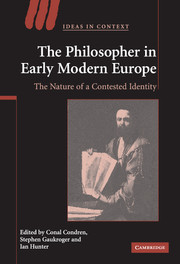Book contents
- Frontmatter
- Contents
- List of contributors
- Acknowledgements
- Introduction
- 1 The persona of the natural philosopher
- 2 The university philosopher in early modern Germany
- 3 The persona of the philosopher and the rhetorics of office in early modern England
- 4 From Sir Thomas More to Robert Burton: the laughing philosopher in the early modern period
- 5 Hobbes, the universities and the history of philosophy
- 6 The judicial persona in historical context: the case of Matthew Hale
- 7 Persona and office: Althusius on the formation of magistrates and councillors
- 8 Descartes as sage: spiritual askesis in Cartesian philosophy
- 9 The natural philosopher and the virtues
- 10 Fictions of a feminine philosophical persona: Christine de Pizan, Margaret Cavendish and philosophia lost
- 11 John Locke and polite philosophy
- Index
- IDEAS IN CONTEXT
Introduction
Published online by Cambridge University Press: 06 November 2009
- Frontmatter
- Contents
- List of contributors
- Acknowledgements
- Introduction
- 1 The persona of the natural philosopher
- 2 The university philosopher in early modern Germany
- 3 The persona of the philosopher and the rhetorics of office in early modern England
- 4 From Sir Thomas More to Robert Burton: the laughing philosopher in the early modern period
- 5 Hobbes, the universities and the history of philosophy
- 6 The judicial persona in historical context: the case of Matthew Hale
- 7 Persona and office: Althusius on the formation of magistrates and councillors
- 8 Descartes as sage: spiritual askesis in Cartesian philosophy
- 9 The natural philosopher and the virtues
- 10 Fictions of a feminine philosophical persona: Christine de Pizan, Margaret Cavendish and philosophia lost
- 11 John Locke and polite philosophy
- Index
- IDEAS IN CONTEXT
Summary
Individuals and the societies in which they live establish and maintain identity in relationship to some sense of a past, principally of interest insofar as it is of practical relevance in the present. The relationship may be unreliable: memories may be mischievous, a heritage fanciful, a history fabricated, or so brutally abridged as to be mythic. Regardless of the confidence with which a ‘past-relationship’ is assumed, however, its disruption can be deeply destabilising. These commonplaces about what Michael Oakeshott called the ‘practical past’ are no less pertinent to academic disciplines than they are to societies and individuals. The history of political theory, for example, still sometimes presented as an on-going tradition of debate and dialogue reaching back to the ancient Greeks, was invented as an authenticating lineage for the newly institutionalised university study of politics only around the end of the nineteenth century. Much the same might be said of the gatherings of canonic texts conventionally studied as histories of national literatures. In all these cases, the posited history retains its shape, momentum and character by the competing needs to affirm, reform or subvert a contemporary disciplinary activity. Such histories are often so present-centred as to be largely convenient lineages, anachronistic in predication of content and ‘whiggish’ in narrative structure.
In many ways the history of philosophy is at one with, and may have been a model for, the patterns of these adjacent academic genealogies.
- Type
- Chapter
- Information
- The Philosopher in Early Modern EuropeThe Nature of a Contested Identity, pp. 1 - 16Publisher: Cambridge University PressPrint publication year: 2006
- 4
- Cited by

